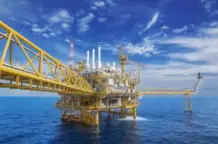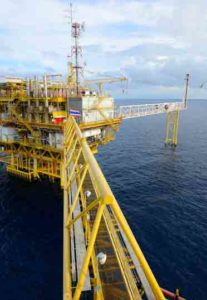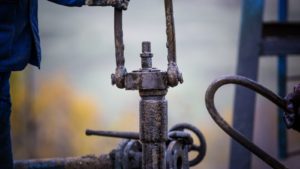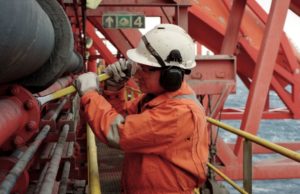
The aftermath of an off-shore accident can be devastating. The maritime workers involved could be left with injuries, perhaps so severe they are unable to work. This is a risk Hammond maritime workers face every day simply doing their jobs.
If you’ve been hurt on an off-shore job site, the Hammond off-shore accident lawyers from our firm are here to help. Our attorneys can do a lot to help you seek compensation, and can handle every aspect of your claim or lawsuit while you rest and recover from your injuries.
Understanding Off-shore Accidents
An off-shore accident happens when the victim is injured while working on navigable water. The oil and gas industry is often involved in these accidents since its operations require employees to work off-shore on different barges, rigs, or platforms.
The dangers of working off-shore, the hazardous nature of working with gas and oil, severe weather conditions, and the necessary drilling equipment contribute to many off-shore accidents. The frequency of off-shore accidents makes this type of work extremely risky. Injuries involved in off-shore incidents include:
- Back injuries
- Burns
- Spinal cord injuries
- Traumatic brain injuries (TBIs)
- Neck injuries
- Drowning
- Broken, bruised, or fractured bones
A Hammond off-shore accident lawyer can help you pursue compensation for these and any other injury you suffer at a maritime worksite.
Laborde Earles injury was great for me they took care of me very fast and professional. If for any reason I need legal help they will be who I use.
ClientHow These Off-Shore Accidents are Caused
If you’re an oil rig or platform worker in the oil and gas industry, you could be exposed to many potential risks in your working environment. Some of the most common causes of off-shore accidents include:
- Chemical Exposure: Workers in the oil and gas industry are often exposed to toxic chemicals for an extended period. Continued exposure to toxic chemicals on oil rig sites has been associated with life-threatening sicknesses like cancer, leukemia, chemical burns, and paralysis.
- Explosions: The oil and gas industry has seen many explosions and fires on its rigs, which is a major risk for burns and even death.
- Transportation: The shipping of oil and gas is to blame for many tragic off-shore accidents. An off-shore accident can happen when a helicopter is struck by lightning or cargo boats capsize in rough waters during transit.
- Dangerous Machines: Massive lifts, drills, traveling derricks, and rotating chains are all used by oil and gas workers daily. Accidents can happen if safety precautions are disregarded when operating the machines or when they’re used in unsecured areas.
- Slips and Falls: Employees in the oil and gas industry work on elevated platforms. Therefore, slips and falls are pretty common. In some cases, a worker can be struck by a piece of equipment, leading to a fall.
I thank God for Digger & David. I don’t know what we would have done if it hadn’t have been for them.
Rick Smith | ClientHow Can These Off-shore Accidents be Prevented?
Working off-shore is dangerous due to the hazardous nature of these job sites. The following are ways that employers and employees can prevent these accidents:
- Provide orientation to new workers. All new or transferred workers should be taken through orientation. Orientation results in a safer work environment since the employees become familiar with regulations, workplace rules, and expectations.
- Train all workers continuously. After orientation, ensure you train the workers on operating equipment and machinery and safety procedures. Providing continuous training to your employees shows your commitment to safety.
- Wear protective equipment when working. An employer should provide personal protective equipment (PPE), such as gloves, safety glasses, hard hats, fire-resistant clothing, respirators, and steel-toed boots. The use of PPE by workers could also ensure their safety.
- Ensure regular maintenance of the machinery. An employer should maintain machinery regularly to avoid early failure and provide a safe working environment. Lack of regular machinery maintenance poses a hazard to the workers operating them.
- Educate subcontractors. Employers should take the subcontractors through the same orientation and training they would give regular staff. Also, only work with individuals with a proven track record of safety.
The reassurance from Digger and his staff gave me that renewed hope that it’s going to be okay down the road.
ClientThe Jones Act
Now that we have a really good idea of what negligence can look like on a vessel or oil rig, we can better understand the Jones Act. The Jones Act allows seamen and off-shore workers who spend at least 30% of their time on a vessel (an oil rig counts if it can be navigated) to sue their employers for compensation if their negligence resulted in that seaman’s injury. A Hammond off-shore accident lawyer can guide you through this lawsuit.
They treated us like no other people would. Whenever we needed something they were there for us. I put my trust in them and I don’t regret it.
ClientThe Longshore and Harbor Workers’ Compensation Act
The Longshore and Harbor Workers’ Compensation Act (LHWCA) provides coverage for maritime workers who don’t qualify for the Jones Act. For example, if you work on an oil rig that is completely stationary, or if you work as a dockworker or harbor worker, the LHWCA would likely apply to you. An off-shore attorney can determine exactly which legal route would be best for you.
What Should I Do After an Off-shore Accident?
After an off-shore accident, you should take the following essential steps to safeguard your health and your right to pursue compensation for your injuries:
- Seek Medical Care: After an off-shore accident, your health and safety are paramount, so seek medical treatment immediately. Even if your injuries seem minor, we advise you to seek medical care. You might have suffered from internal injuries that are not noticeable immediately.
- Report the Accident to Your Employer: This is required for any sort of compensation claim and should be done as soon as possible. The Jones Act requires you to report the accident to your employer within just seven days.
- Contact the Authorities: You should inform the police about your off-shore accident as well. The police will document the accident and include witness statements in an official report. These reports are important since they can be used as evidence for your off-shore injury claim.
- Document the Scene: You should take videos and photos of your injuries, the accident scene, and any damage to your property. Also, collect the contact info of any eyewitnesses. If you are unable, your Hammond off-shore accident lawyer can do this for you.
Call Laborde Earles Injury Lawyers Today
If you’ve been injured in an off-shore accident, our lawyers serving the Hammond area can help you pursue compensation. At Laborde Earles Injury Lawyers, we’re ready to answer any questions concerning your case and can handle all aspects of your claim. Call today to schedule a free consultation.




